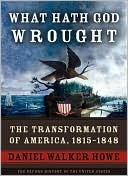More on this book
Community
Kindle Notes & Highlights
The Millerites, like many other American millenarians, combined their “ideological archaism” with “organizational modernity.”14
Bible-centered Protestantism, synthesized with the Enlightenment and a respect for classical learning, helped shape the culture, determine the patterns of intellectual inquiry, and define the terms of debate in the antebellum American republic. On the slavery issue, the synthesis was ambiguous; in most other ways it underwrote democratic values. It supplied a young and rapidly changing society with a sense of stability. Without resolving moral controversy, it endowed moral standards and rational discourse with each other’s authority, strengthening both.
Democrats basically approved of America the way it was. They wanted to keep it economically homogeneous in the sense that they believed agriculture should remain the predominant occupation, though their party had nothing against the expansion of commercial opportunities for planters and farmers. Democrats enjoyed their greatest party strength in the South, where agriculture predominated even more than in the North. They expressed disapproval of government favors for privileged elites, of which a national bank seemed to them the prime example. Democrats celebrated “popular sovereignty” and the
...more
This highlight has been truncated due to consecutive passage length restrictions.
and cultural diversity, Whigs favored economic diversity and cultural uniformity. They wanted to impose cultural (moral) homogeneity because they strongly believed in a society that would nurture and respect conscientious individual autonomy, in contrast to the Democrats, who valued the autonomy of the small white community. Much more than Democrats, Whigs worried about lawlessness, violence, and demagogy. Duties seemed to them as important as rights, and both individuals and the nation had a responsibility to develop their potential to the fullest. Causes like temperance and public education
...more
Whig ambitions to transform America were more qualitative than quantitative; sheer geographical extension of the nation’s boundaries appealed to them little unless it promised economic development. A comparison between the parties does not reveal a perfect symmetry. The Whigs possessed a more coherent program: a national bank, a protective tariff, government subsidies to transportation projects, the public lands treated as a source of revenue, and tax-supported public schools. The Democrats of course denounced the Whig plans, but beyond this, they often displayed a set of generalized attitudes
...more
One policy that the Democratic Party embraced consistently was white supremacy.
Jacksonians welcomed transporting farm products to market, so long as it could be done without the centralized planning that raised the specter of emancipation. As he did so often, the perceptive former president Adams saw to the heart of the matter. Solicitude for slavery constituted the real obstacle to federal internal improvements, he told his constituents. If the internal improvement of the country should be left to the legislative management of the national government, and the proceeds of the sales of public lands should be applied as a perpetual and self-accumulating fund for that
...more
Nevertheless, American imperialism did not represent an American consensus; it provoked bitter dissent within the national polity. The Whig Party conceived of American development more in terms of qualitative economic improvement than quantitative expansion of territory. As Henry Clay wrote to a fellow Kentuckian, “It is much more important that we unite, harmonize, and improve what we have than attempt to acquire more.” The historian Christopher Clark has distinguished between the two partisan goals by saying the Democrats pursued America’s “extensive” development and the Whigs its
...more
On February 2, 1848, the peace commissioners signed their document “In the Name of Almighty God” at Guadalupe Hidalgo, site of Mexico’s national shrine to the Blessed Virgin Mary, which Trist chose as a location to impress the Mexican public with the treaty’s authority.29 Polk’s order to General Butler to terminate the negotiations forcibly arrived too late to prevent the signing. Later the American diplomat revealed to his wife what had been his guiding principles. My object, through out was, not to obtain all I could, but on the contrary to make the treaty as little exacting as possible from
...more
This highlight has been truncated due to consecutive passage length restrictions.


